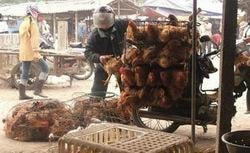Emergency response plan for dangerous influenza virus
Minister of Agriculture and Rural Development Cao Duc Phat has just signed a decision to promulgate an Action Plan to respond urgently to dangerous influenza virus strains that can spread to humans.
The objective of the Plan is to minimize the risk of A/H7N9 influenza virus entering Vietnam through the illegal import of poultry and poultry products. Early detection and timely handling as soon as A/H7N9 influenza virus enters Vietnam.
In addition, it minimizes the risk of A/H7N9 influenza virus infecting poultry and humans.
 |
| Prohibition of trading, transporting and smuggling poultry across the border - Illustration photo |
With the "One Health" approach, in which there is close cooperation between the veterinary sector and other sectors such as health, market management, customs, border guards, police, local authorities and international organizations to deploy the most comprehensive and effective measures, ensuring the achievement of the set goals, the Action Plan is built on 4 scenarios.
Scenario 1: No A/H7N9 influenza virus has been detected in poultry, the environment or humans.
Scenario 2: No A/H7N9 influenza virus has been detected in poultry or the environment, but there are people infected.
Scenario 3: A/H7N9 influenza virus is detected in poultry or the environment, but no people have contracted the disease.
Scenario 4: A/H7N9 influenza virus is detected in poultry or the environment and there are people infected.
Regarding implementation solutions, the Ministry of Agriculture and Rural Development stated that the current top priority measure is to strictly prohibit the trading and transportation of smuggled poultry and poultry products across the border, including the donation of unprocessed poultry and poultry products, to prevent the virus from entering the country.
Organize cleaning, disinfection, and sterilization of border gate areas, trails, openings, and means of transporting goods across the border. Do not allow trading, collecting, gathering, and slaughtering poultry in border areas and open economic zones to avoid the phenomenon of legalizing poultry and facilitate control.
In addition, strengthening the capacity of the veterinary sector such as: Organizing training for local veterinary staff on techniques for sampling, preserving and sending samples for surveillance of influenza A/H7N9 virus; diagnostic and testing capacity; contacting international reference laboratories on influenza of WHO, FAO, Australia, the United States and China to update technical procedures for diagnosing and testing influenza A/H7N9 virus and other influenza viruses (A/H5N1, A/H10N8, A/H5N2, A/H6N1).
Mobilize support from countries and international organizations in terms of experts, equipment, and funding for epidemic prevention and control corresponding to each situation, focusing on activities such as monitoring the A/H7N9 influenza virus, developing specific response plans for each epidemic situation, conducting epidemic response drills, assessing risks, etc., as well as communicating to raise awareness among relevant parties in epidemic prevention.
Ensure funding for avian influenza prevention activities
According to the Ministry of Agriculture and Rural Development, the State budget provides targeted support to the central and local budgets to ensure funding for avian influenza prevention activities.
Accordingly, the central budget ensures funding for directing and inspecting epidemic prevention and control work, preventing poultry smuggling into the country, organizing surveillance, detecting and isolating viruses, training, conferences, seminars, research, sending samples abroad, communication work, poultry destruction and environmental treatment.
The local budget ensures funding for directing and inspecting epidemic prevention and control work, preventing poultry smuggling into the country, monitoring, training, conferences, seminars, sending test samples, information and propaganda, costs for epidemic prevention activities and supporting poultry owners, implementing measures at poultry markets, purchasing tools, labor protection, disinfectants and implementing disinfection, poultry culling and environmental treatment.
In the immediate future, ministries, branches and People's Committees of provinces and cities should proactively use the budget sources in the assigned estimates. If there is a need for additional funding, they should propose the Ministry of Agriculture and Rural Development to synthesize and send it to the Ministry of Finance and the Ministry of Planning and Investment to report to the Prime Minister for consideration and decision.
According to chinhphu.vn
